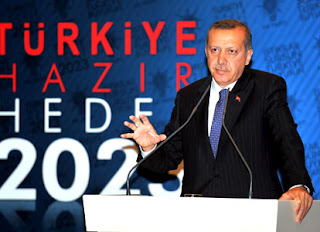Ahead of the AKP's expected victory on Sunday, Prime Minister Erdogan announced plans to alter the structure of his cabinet, a move many are reading as a step toward realizing Erdogan's ultimate ambition to establish a presidential system.
The new cabinet will contain 25 ministers, including the prime minister. Some ministries, such as the Ministry for Women and Family, will be eliminated or merged, while six more will be added. From Hurriyet Daily News:
If his ruling Justice and Development Party, or AKP, is returned to power in the June polls, Erdoğan said, the administration will have six new ministries, while the total number of ministries will be lowered from 27 to 25.One concern with the new plan is that each ministry will now have an undersecretary responsible for the technical aspects of the ministerial portfolio as well as a deputy prime minister responsible for the politics involved therein. What happens if the two ministers have conflicting views? Will the deputy ministers, who do not sit in parliament, be subject to parliamentary oversight?
The prime minister said eight current state ministries will be abolished. The new ministries will be the Ministry of Family and Social Policies, the Ministry of European Union, the Ministry of Economy, the Ministry of Youth and Sports, the Ministry of Customs and Trade and the Ministry of Development. The Ministry of European Union will coordinate the affairs for Turkey’s EU bid.
Currently these areas fall under the responsibility of state ministers in Ankara; the new ministries will also have offices around the country.
“We will also create a deputy minister position” that will rank between the minister and the undersecretary, Erdoğan said, speaking at his party’s headquarters.
The new Cabinet will include 20 ministers plus the prime minister and four deputy prime ministers. Each of the 20 ministers will be assigned deputies.
The deputy ministers will not be parliamentary deputies, but will be appointed to their positions with the new government and will leave their posts if it is voted out of power. The deputy ministers will be experts in their sectors and will be selected for their ability to make the ministries operate faster and more efficiently, Erdoğan said. “It will be possible to bring them in from the private sector,” he added.
Each deputy minister will be appointed with the approval of the respective minister, the prime minister and the president. The appointees will not have to have university degrees, “and can even be elementary school graduates,” Erdoğan said, pointing to important businesspeople such as Vehbi Koç as examples.
“They will work as a political undersecretary, and the current undersecretaries will carry out the administrative functions,” the prime minister said.
Some ministries will be renamed or merged under the proposed restructuring. The Ministry of Industry and Trade will become the Ministry of Science, Industry and Technology, while the Ministry of Agriculture and Rural Affairs will be changed to the Ministry of Food, Agriculture, and Livestock. The Ministry of Environment and Forestry will meanwhile merge with the Ministry of Public Affairs and Settlement to become the Ministry of Environment, Forestry and City Planning.
Hurriyet Daily News columnist Izgi Gungor reviews some of the potential problems with the deputy minister scheme here, including the potential for further privatization given that the deputies will be appointed outside normal bureaucratic channels and that many of whom will be coming from the private sector. Privatization of public resources has been a keystone of Erdogan's political and economic agenda.
President Gul has expressed his opposition to the presidency, which Erdogan has expressed his intention to occupy should a presidential system come to be as the government moves forward to re-write a whole new constitution after Sunday's elections.
UPDATE I (6/9) -- Human Rights Watch echoes the concerns of many Turkish women's groups in response to the government's plans to eliminate the Ministry for Women and Family Affairs. The government is planning to create another ministry re-named the Ministry of Family and Social Policies. Women's groups have expressed concerns that women's issues are important only insomuch as they involve the family and this despite rising domestic violence and continuing problems related to underemployment and representation in politics. Jenny White expounds on the problem here.
UPDATE II (6/10) -- The CHP has announced its intention to challenge the restructuring at the Constitutional Court. For more, click here.







